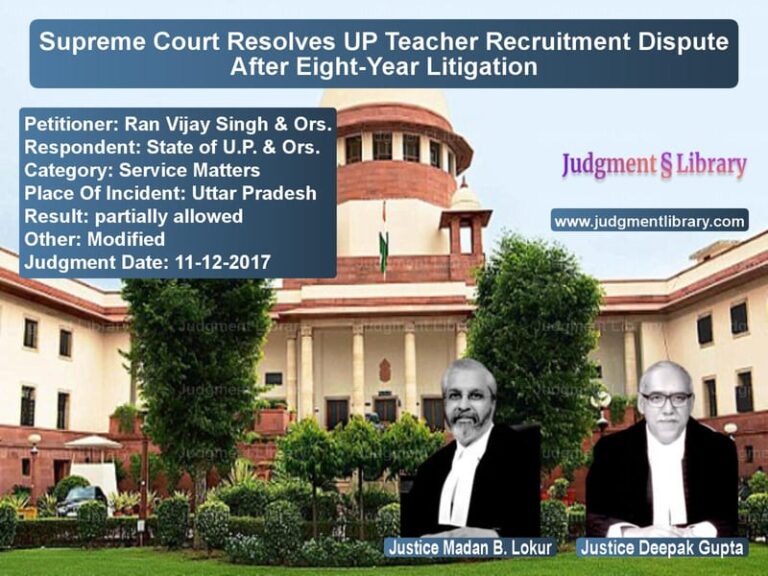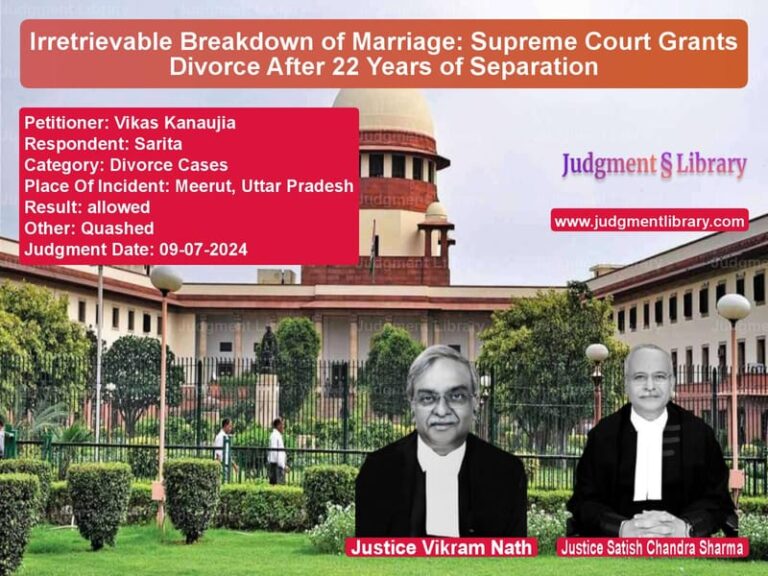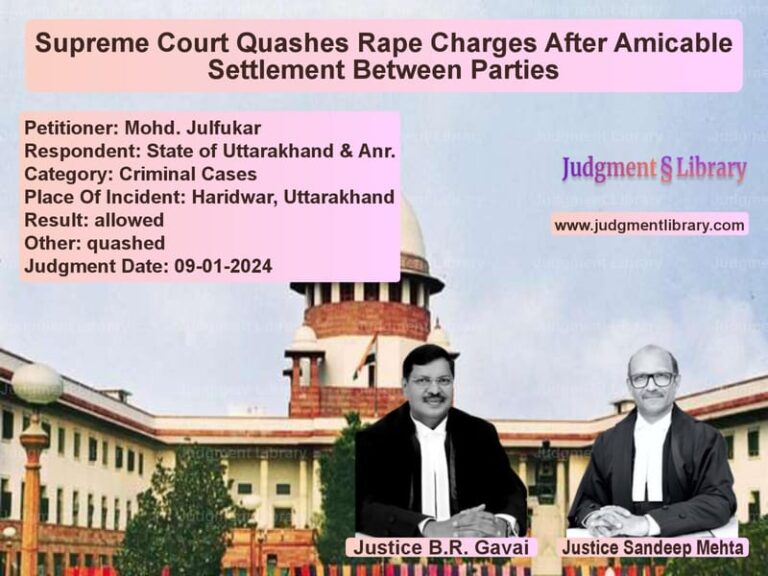Trusteeship Dispute and Residency Clause: Supreme Court’s Ruling on Qualification for Founder Trustee
The Supreme Court of India recently delivered a significant judgment in V. Prakash @ G.N.V. Prakash vs. M/s. P.S. Govindaswamy Naidu & Sons’ Charities. This case revolved around a trusteeship dispute in the respondent Trust, where the appellant, claiming to be the rightful successor, was denied trusteeship on the grounds of residency. The verdict clarifies the interpretation of residency clauses in trust deeds and the application of principles such as res judicata and estoppel.
Background of the Case
The appellant, V. Prakash, filed a suit seeking a declaration that he was entitled to be appointed as a founder trustee of the respondent Trust. The dispute arose when the managing body denied his claim, citing that he was a Green Card holder of the United States and did not fulfill the requirement of ‘residing within the Madras Presidency’ as per the Scheme of Administration (SOA) governing the Trust.
The Trial Court ruled in favor of the appellant, declaring him eligible for trusteeship. However, the High Court overturned this decision, holding that he failed to meet the residency requirement.
Arguments of the Appellant
- The appellant contended that he met all the qualifications required for trusteeship, including being a Hindu and a direct male descendant of the original founder trustees.
- He argued that his Green Card did not equate to permanent residency in the U.S. and that he had been an Indian citizen throughout.
- The Trust had previously appointed him as a trustee, and no objections were raised about his qualification at that time.
- The principle of estoppel should apply since the Trust had previously accepted his eligibility.
- The residency clause in the SOA should be interpreted in a modern context, considering advancements in communication and travel.
Arguments of the Respondents
- The Trust and its managing trustees opposed the appellant’s claim, stating that he had spent less than half of his time in India over the past several years.
- They argued that the appellant’s Green Card status made him a permanent resident of the U.S., which disqualified him from being a trustee.
- According to the SOA, a trustee must reside within the Madras Presidency, and the appellant did not meet this requirement.
- The earlier appointment of the appellant was conditional and did not serve as a precedent.
- There was no legal basis for applying the principles of res judicata or estoppel in this case.
Supreme Court’s Judgment
After reviewing the case, the Supreme Court ruled in favor of the appellant, stating:
- “The appellant has been an Indian citizen and has provided sufficient proof of residence in India.”
- The term ‘resides’ in the SOA must be interpreted contextually and cannot be strictly confined to physical presence.
- The High Court erred in dismissing the principles of estoppel and res judicata, as the Trust had previously accepted the appellant’s qualification.
- The residency requirement should not be interpreted rigidly in a globalized world where individuals frequently travel for work and personal reasons.
- The appellant’s appointment as a trustee should be reinstated.
Implications of the Judgment
This ruling has several important implications:
- Trust deeds with residency clauses should be interpreted flexibly to account for changing socio-economic conditions.
- Green Card holders cannot automatically be deemed as non-residents of India for legal purposes.
- Organizations must be consistent in their application of eligibility criteria and cannot arbitrarily change their stance.
- The ruling strengthens the application of estoppel in legal disputes concerning eligibility.
Conclusion
The Supreme Court’s decision in this case underscores the importance of fair and reasonable interpretation of legal provisions. By ruling in favor of the appellant, the Court has reaffirmed the principle that trusteeship disputes must be resolved based on facts and legal precedents rather than rigid technicalities. This judgment sets a crucial precedent for similar disputes involving residency clauses in legal agreements.
Petitioner Name: V. Prakash @ G.N.V. Prakash.Respondent Name: M/s. P.S. Govindaswamy Naidu & Sons’ Charities.Judgment By: Justice Vineet Saran, Justice Dinesh Maheshwari.Place Of Incident: Coimbatore, Tamil Nadu.Judgment Date: 09-05-2022.
Don’t miss out on the full details! Download the complete judgment in PDF format below and gain valuable insights instantly!
Download Judgment: v.-prakash-@-g.n.v.-vs-ms.-p.s.-govindaswa-supreme-court-of-india-judgment-dated-09-05-2022.pdf
Directly Download Judgment: Directly download this Judgment
See all petitions in Property Disputes
See all petitions in Succession and Wills
See all petitions in Judgment by Vineet Saran
See all petitions in Judgment by Dinesh Maheshwari
See all petitions in allowed
See all petitions in Quashed
See all petitions in supreme court of India judgments May 2022
See all petitions in 2022 judgments
See all posts in Civil Cases Category
See all allowed petitions in Civil Cases Category
See all Dismissed petitions in Civil Cases Category
See all partially allowed petitions in Civil Cases Category







